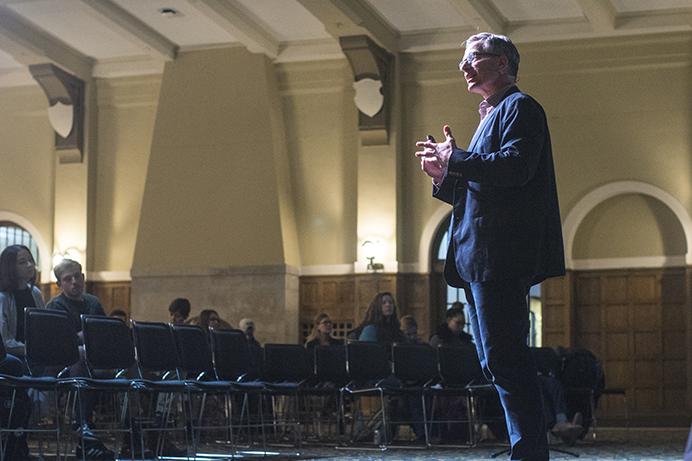By Madeleine Neal
When it comes to the First Amendment, University of Iowa Student Government President Rachel Zuckerman said understanding free speech is one of the issues in which she has matured the most over the past year.
The Graduate and Professional Student Government, UISG, University Lecture Committee, IMU, and the President’s Office presented an all-day event about the First Amendment in Modern America Tuesday in the IMU.
Zuckerman said dialogue about the First Amendment is important.
“[It is] so important to have robust dialogue,” she said. “Students [must] feel safe.”
The issue, she said, is what happens when dialogue and student safety do not mix.
“[There’s] never a perfect answer,” she said. “[But] the things people [say] have real effects.”
Zuckerman said she believes it is important to remember that the people who made these laws have had immense privilege, although that is no reason to be upset with them.
However, she said, she does believe the privilege of those who wrote free-speech laws gives people a need to re-examine them.
“In [my] opinion, it’s not right to knowingly reserve the right to [hurt] other people,” she said.
The event featured Ana Navarro, a Republican strategist and political commentator, Paul Gowder, a UI professor of law, Christina Bohannan, a UI professor of law, Laura Kipnis, a professor at Northwestern University, David Ryfe, a UI professor of jounalism, Jamelle Bouie, a chief political correspondent for Slate, and Franchesca Ramsey, a comedian and video blogger.
Bouie said the issue of free speech is not just a matter of getting offended.
“[We cannot] give legitimacy to ideas that exist in a society when there is racial oppression,” he said. “We don’t need to live in that kind of society.”
Bouie said he believes the solution lies in civil society.
“As it stands, I think we’re too ‘loosey goosey’ when it comes to racist ideas,” he said. “[We’re] too tolerant of public figures who make racist comments.”
Bouie said he thinks society needs to have swifter responses.
Community members, he said, should know that drawing a swastika on a wall will result in the appropriate community response.
“When [responses] don’t exist, there can be a feeling of alienation,” he said.
UI sophomore Sriven Kadiyala, however, said he thinks free speech on college campuses is a positive thing, but there needs to be a distinction between free speech and hate speech.
“This is a blurry line,” Kadiyala said. “And so a lot of confusion surrounds it.”
He said he believes that the more views that we are exposed to in a safe place, the more attuned students can become to the different people in the real world.
“This will eventually lead us to become more tolerant individuals,” he said. “[Although] this is not to say that we must be tolerant of everything, but we must be able to accept someone’s opinions as nothing but that, and practicing free speech on campuses helps with that.”



